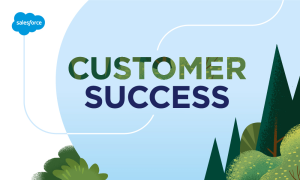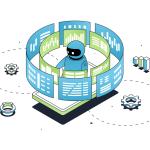With a career that has spanned the worlds of oil and gas, real estate and aviation, the path that led Jackie Kankam to a major beauty brand may not be an obvious one. And yet, it may be the ideal place to continue her mission to grapple with the toughest environmental, sustainability and social challenges of our time.
At Toronto-based DECIEM, Kankam is working in a sector not always known for practices that protect natural resources or promote diversity, equity and inclusion (DEI). That’s one of the reasons the brand has stood out for its efforts to use business as a platform for change. It’s also why she loves her job.
“You don’t often find someone in my position who gets to work on all three pillars, even though they’re so connected,” Kankam, DECIEM’s Director of Sustainability and Social Impact, said during a session at Salesforce Canada’s recent Growing With Purpose virtual event. “There’s usually someone who works on sustainability, someone who does DEI and someone who does social impact.”
That doesn’t mean Kankam feels she is working in isolation, however. She points not only to her company’s leadership and employees but what she described as the wider DECIEM family. She said the brand’s partners, suppliers and even customers are all part of a conversation that’s leading to changes in how it addresses issues such as climate change.
Reflecting Canadian values
DECIEM’s outlook is well-aligned with those of Canadian consumers, based on recent research from Salesforce Canada. In fact, the vast majority of those surveyed, or 83%, want to support brands that prioritize values and profit equally.
Some of DECIEM’s actions to date include the introduction of carbon neutral unit boxes that help combat harmful emissions in manufacturing, moving to biodegradable materials in e-commerce packaging and transitioning to 100% recyclable shopping bags.
Keeping in mind the DECIEM family is one of the ways Kankam said the company’s strategy reflects the intersectionality of environmental, sustainability and social impact concerns. She used Argan oil, which is among the products it sells through The Ordinary Beauty Company, as an example of how this works in practice.
“Argan oil comes from Morocco — if that field where we source it from isn’t around in 10 years (because of climate change), it’s going to have a detrimental impact on our business,” she said. “Then you also start to think, ‘What’s life like for the people growing that product? Do we know?’ And then there’s a DEI aspect — are they members of marginalized groups? So when you look at the climate aspect, it also affects those other pillars.”
Collaborating with customers and partners
Another way of approaching intersectionality is to focus on not only growing revenue with customers but educating them along the way. DECIEM refers to its highly engaged fans as “skintellectuals” who are often asking tough questions about the brand’s ingredients and practices. Or even basic questions, like how to recycle or reuse products.
“Our strategy is about empowering them,” she said. “When we launch our new web site, every single component has an education piece, and everything is oriented around being transparent about where we are, where the beauty industry is and where the world is.”
Again, the Salesforce survey bears this out as well: half of Canadians said they will actively search for a company’s values before shopping with them. The same goes for its ecosystem of suppliers and partners; 45% of Canadian shoppers said that a brand can earn their trust by providing transparency when it comes to their supply chain.
DECIEM makes efforts to work with smaller firms, even if they aren’t fully aware of what it means to set a science-based target to combat climate change.
“Yes, we could shift and work with a bigger supplier, or we could say, ’Let us help you on this journey,’ because it’s affecting all of us,” she said.
It is somewhat surprising, therefore, to visit the DECIEM web site and see the company says flatly it is not yet a sustainable beauty brand.
“I’ve had colleagues in the beauty space call me and ask, ‘Why do you say that? You’re doing great.’ And I say, ‘Because we’re not,’” she said. “The conversation between myself and the leadership team has shifted to, ‘What is a sustainable beauty company? Are we ever going to be one?’”
That humility is paired with efforts to cultivate an internal culture where employees are eager to develop their understanding of the issues, and a policy of being transparent about its progress. In a recent DEI update it released, for instance, Kankam said DECIEM changed a tagline of “Nothing changes if nothing changes” to “Nothing changes until something changes.” It’s a subtle but critical nuance.
“We said there are parts of this where we are not as far along as we want to be,” she said. “That’s what your customers want. That’s what your employees want — just be honest.”
It’s true. The Salesforce Canada research showed 38% of Canadian shoppers said that brands can earn their trust by quantifying and sharing their efforts publicly, and 51% of Canadian shoppers said that brands can earn their trust by publicly acknowledging when they make mistakes or missteps.
Kankam’s other advice for companies that want to further their environmental and sustainability efforts is to think about how they can improve their ability to measure their impact. She likened it to losing weight: before you set your target, you need to weigh yourself. This could involve proprietary research, engaging with outside experts, or using tools such as Salesforce’s Net Zero Cloud to capture details like a company’s carbon footprint.
Once companies know where they stand, Kankam urged them to be as holistic as possible, looking for strategies that will allow them to tackle not only climate change but DEI in the workplace and their contribution to the communities they serve.
“We really believe that it’s about building growth to power good,” she said. “If you tie a lot of these things together, in my opinion it just becomes easier.”

























